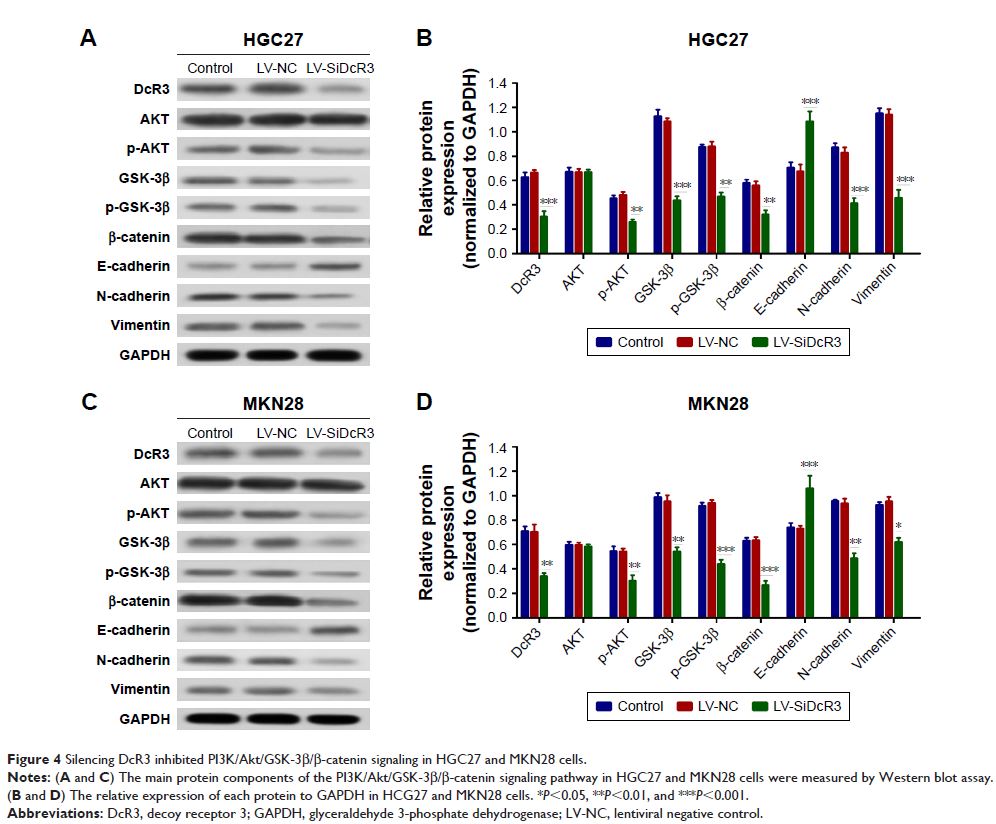9 0 5 7 8
论文已发表
注册即可获取德孚的最新动态
IF 收录期刊
- 2.6 Breast Cancer (Dove Med Press)
- 3.9 Clin Epidemiol
- 3.3 Cancer Manag Res
- 3.9 Infect Drug Resist
- 3.6 Clin Interv Aging
- 4.8 Drug Des Dev Ther
- 2.8 Int J Chronic Obstr
- 8.0 Int J Nanomed
- 2.3 Int J Women's Health
- 3.2 Neuropsych Dis Treat
- 4.0 OncoTargets Ther
- 2.2 Patient Prefer Adher
- 2.8 Ther Clin Risk Manag
- 2.7 J Pain Res
- 3.3 Diabet Metab Synd Ob
- 4.3 Psychol Res Behav Ma
- 3.4 Nat Sci Sleep
- 1.9 Pharmgenomics Pers Med
- 3.5 Risk Manag Healthc Policy
- 4.5 J Inflamm Res
- 2.3 Int J Gen Med
- 4.1 J Hepatocell Carcinoma
- 3.2 J Asthma Allergy
- 2.3 Clin Cosmet Investig Dermatol
- 3.3 J Multidiscip Healthc

DcR3 通过 PI3K/AKT/GSK-3β/β-连环蛋白信号通路在胃癌细胞中诱导增殖、迁移、侵袭和 EMT
Authors Ge H, Liang C, Li Z, An D, Ren S, Yue C, Wu J
Received 30 April 2018
Accepted for publication 7 June 2018
Published 19 July 2018 Volume 2018:11 Pages 4177—4187
DOI https://doi.org/10.2147/OTT.S172713
Checked for plagiarism Yes
Review by Single-blind
Peer reviewers approved by Dr Andrew Yee
Peer reviewer comments 3
Editor who approved publication: Dr William Cho
Background: Decoy receptor 3 (DcR3) has been reported to be overexpressed in a
wide variety of malignancies and is correlated with tumorigenesis and
progression. In gastric cancer (GC), DcR3 overexpression is associated with
lymph node and distant metastasis, as well as poor prognosis. However, the
functional role of DcR3 expression in GC remains elusive.
Purpose: The aim of this study is to elucidate the direct role of DcR3 in
regulating GC progression and metastasis and identify the potential mechanism.
Methods: DcR3 expression was stably knocked down in HGC27 and MKN28 cells
by transfecting the cells with DcR3 shRNA using lentiviral vector system. After
the knockdown of DcR3 was confirmed, cell proliferation, colony formation, cell
cycle distribution, apoptosis, cell invasion and migration were assessed in
vitro. In addition, Western blot analysis was performed to evaluate the
expression of downstream mediators of DcR3. Comparisons between multiple groups
were performed using one-way analysis of variance (ANOVA) or unpaired Student’s
t-test. Differences were considered significant at P <0.05.
Results: Our findings demonstrate that DcR3 induces proliferation,
migration, invasion, and promotes epithelial-mesenchymal transition (EMT) of GC
cells. In addition, DcR3 increases the expression levels of several components
of the PI3K/AKT/GSK-3β/β-catenin signaling pathway, such as p-AKT, GSK-3β,
p-GSK-3β and β-catenin. Additionally, DcR3 also enhances the expression of N-cadherin
and Vimentin and decreases the expression of E-cadherin.
Conclusion: In summary, the findings of this study indicate that during GC
progression, DcR3 plays a key role in cell proliferation and invasion via the
PI3K/AKT/GSK-3β/β-catenin signaling pathway. Thus, targeting DcR3 might be a
potential therapeutic approach for the treatment of GC.
Keywords: DcR3, gastric cancer, epithelial–mesenchymal transition,
metastasis
